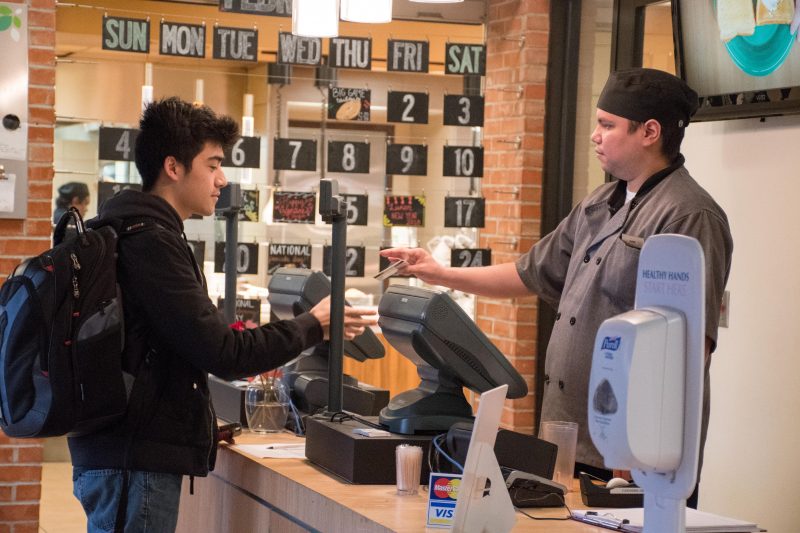Mabee dining hall, and Aramark in particular, are often the target of students’ ire. But why? There is currently a policy against dining swipes being used for multiple people. Aramark and dining services intend for swipes to be used by one individual.
Though dining plans, policies and prices are managed by Aramark, the enrollment of students in meal plans is run through the Tiger Card office.
Oralia Carrillo, systems administrator in the Tiger Card office, doesn’t understand why this policy exists.
“They pay for the meal plan, they get 200 meal points or swipes, and so many bonus bucks, why can’t they use those 200 swipes on whoever they choose?” Carrillo said. “The standard answer with that was the contract that Aramark made with Trinity; I don’t know the logic behind that.”
The most common meal plan with swipes on campus is the flex 200, which is composed of 200 meal swipes at Mabee and 475 Bonus Bucks to spend at different retail locations on campus.
Paul Wright, director of business operations for Tiger Card, elaborated more on the policy in an email interview.
“The industry standard regarding meal plans is that meals are non-transferable because pricing is based on individual use,” Wright wrote.
Wright also shared that between 25 and 30 percent of meal swipes are not used every semester, and since these don’t roll over from semester to semester, they are not able to be used.
We reached out to Charles Robles, food service director for Aramark, but were unable to secure a comment by press time, presumably because of a new interview policy. When contacted about scheduling an interview, we were directed to send our questions to be answered via email. We did not receive a response prior to publication.
Both Wright and Bruce Bravo, senior director of conferences and auxiliary services, are on the committee that is completing the search for a new dining services provider.
“We will unequivocally have a new dining contract in place on June 1,” Bravo said. “The provider’s name is not ready for public consumption yet; the decision is pending at this point.”
They mentioned that this policy could be negotiated away in that phase of the search with any provider, whether it is Aramark or another option.
“I think this could be some good stuff to go in and find out why swipes can’t be shared,” Bravo said. “We’ll ask the consultant, ‘Is there any institution that lets students share swipes?’ ”
Bravo and Wright postulated that the unlimited meal plan could be a reason as to why Trinity does not allow the sharing of meal plans, but there was no solid answer.
Nick Berta, first-year, said that he wasn’t surprised by the policy.
“Sharing swipes shouldn’t be allowed if the student is on unlimited swipes,” Berta said. “However, if a student has a limited number of swipes, they should be able to use them in any way they would like.”
The pricing of meal plans varies from year to year, but recent years have seen a steeper climb in prices. The toughest part of meal plan pricing is finding the right value, according to Bravo.
“Labor has just become such a cost, because you don’t have a stable labor market,” Bravo said. “You also have to include an elevated cost of food in the total cost of food service.”
When pricing meal plans, all of these costs are factored in to find the best value for students who must pay for room and board. According to Bravo, this is not a problem unique to Trinity, or even to San Antonio.
“I don’t think anyone is immune,” Bravo said. “I don’t care whether you’re in Wichita Falls, Texas, or Bangor, Maine — help is hard to find.”
Ultimately, the swipe-sharing issue very well might be fixed with the new dining contract, whether it is with Aramark or any other proposing company. The results of that request for proposals should be available to the public soon.
“I can’t tell you the company, but what I can tell you is that the committee made a unanimous recommendation,” Bravo said.













